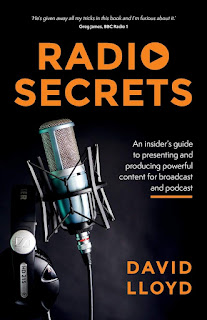Don’t you
just love the smell of old books. That whiff of history.
‘Local
Radio in the Public Interest’ was a delicious aquamarine pamphlet, published
proudly by the BBC in February 1966 as it laid claim to local radio. If there were to
be a local radio network once more, the BBC should bloody well provide it, argues
this vintage stapled document.
In just 15 musty pages, Auntie sets out her stall for the next phase of broadcasting in the white heat of the Harold Wilson era. Amidst the BBC Trust's 2015 local radio review it makes interesting reflective reading.
BBC Local
stations would "devote themselves to local issues and interests, to provide a
service which would effectively enlarge the range of broadcasting in Britain".
Fearing the sceptical reader’s harrumph, the following paragraph explains: "it
would be a mistake to assume that all this would make dull broadcasting. People like to have their radios talking to them, especially when the talking
is done by friendly and familiar people about matters which touch them directly".
There’s an
insistence on truly local stations, not made-up regions. "Long experience of
regional and area broadcasting has convinced the Corporation that a station
addressing a plurality of local groupings is continually at a disadvantage – as
its listeners can never be sure that what it is saying is really meant for
them, rather than for the people in another town".
 |
| Frank Gillard |
The Corporation
did concede that ad-hoc station groupings could be arranged tactically where
there was merit in the content.
Such stations
cost £30-35k to set up, including transmitters, studios and ‘office appliances’. I'm unsure just how many office appliances existed back then. A guillotine maybe? An overhead projector? Or
the station manager’s legendary Friday afternoon cocktail cabinet.
Premises would be 'inexpensively rented'.
At the
outset, VHF (FM) alone was thought to be sufficient for transmission. FM set penetration was, at
that time, approaching the same level as DAB is now.
"15 men and
women" would be poised to operate the station, with running costs overall at
about £1,000 a week. “The station must
be on air right through the day. Unless there is consistency, listeners will
never remember when it is available and when it is not.” At the end of local broadcasts, station managers were trusted to "switch over" to whichever BBC network they
liked for however long they liked.
The
prospect of non-BBC local radio was derided. Auntie conceded, however, that commercial
‘jukebox’ stations could be on-air quicker, not least because ‘their staff
would mainly be disc jockeys, and they could be imported readily enough from
overseas”. Gosh.
Whilst a network
of 80 stations was outlined, not least if 5 shillings could be added to the
licence fee, the Beeb did suggest it could manage a modest nine at no extra cost.
The latter plan came to pass.
Far from
the ‘monolithic’ BBC image, it argued that responsibility for local radio would
be delegated: “The aim would be that listeners would come to regard their local
station as our station not as the BBC station in our town. The BBC would not try to impose a central
pattern or any form of detailed overall control on its local stations”. They would "do much to make listeners proud of their community and willing to take part in its affairs".
Station
managers would be "of the best possible quality…expected to participate in
local affairs". They would be "close to their listeners" and decent means of keeping in touch with their views would be established.
The pamphlet then lists a managers’ charter, under which I suspect
most gifted Man Eds would like to work today.
For those
seeking a 21st Century blueprint for BBC local radio, these fifteen
pages make a decent start. Back to
basics: genuinely local; sensible staffing; listener-driven; managers allowed to manage; staff steeped
in their areas; operated at a bargain basement budget; inexpensive premises; transmitted only on the right
platforms; no 'made-up regions'; ‘friendly and familiar people on-air’.
The fact that the entire local radio philosophy could be outlined in 1966 at a length equivalent to a modern-day compliance memo speaks volumes.
If ever the
BBC invite me to present formally my detailed blueprint for local radio away from its crazy BBC News landlord – and I hope they will
one day – I shall hand out this fusty 15 page pamphlet over coffee first; before I outline
how we would take advantage of the most modern technology, radio thinking and contemporary audience insight to deliver
on the 1966 principles - at a price sustainable for the next generation.
Radio Secrets is a comprehensive guide to contemporary presentation and production techniques in all formats, from writing to delivery, across radio and podcasting.Read this book and gain insights into:
Tight contemporary music presentation-
Generating engaging talk content-
Developing authenticity and likeability-
Handling double-acts, callers and contests-
Understanding the audience and keeping them listening
If you grew up in the 60s 70s and 80s and loved radio - Radio Moments will chime.
It's a very personal, nostalgic view of radio since the start of Radio 1, 2 and BBC local, through the hectic years of early commercial radio, as seen through the eyes of this little lad who grew up just wanting to be on the radio.
The happiness and heartaches, successes and failures, launches and consolidations. Read about the characters of an era which will never be repeated.









Very simple solution for BBC LR: Radio 2 has successfully captured the old Radio 1 audience by, well aping Radio 1 circa 1994. All BBC LR has to do is copy old ILR format circa 1987 - and drop some of the ruddy sport!!
ReplyDeleteAnd no, I'm not Len Groat.